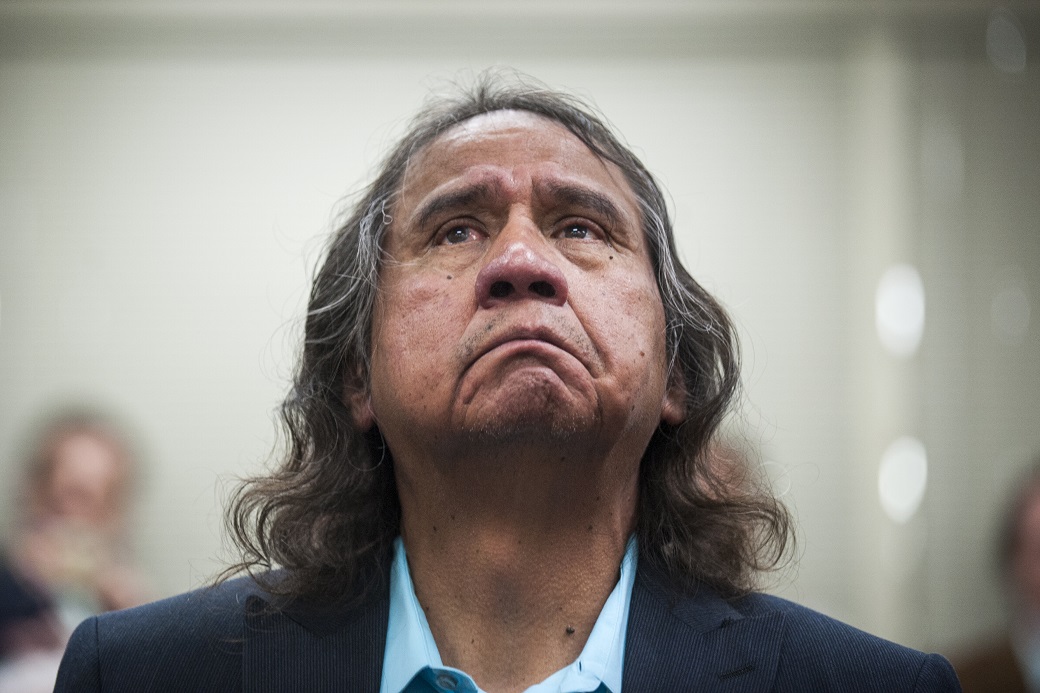
[:en]“We have to start the healing process,” Brewer said said. “We don’t have the resources to help our people. Our children go to school every day. Many of them are abused mentally, physically, sexually abused. And they get to school and we have no resources to really help them.”
Omaha attorney Dave Domina, who brought the case against the beer store owners, was emotional after the vote.
“I don’t think you can be a human being and not be moved by it,” he said breaking into tears.
Meanwhile, Scottsbluff attorney Andrew Snyder, who represented the beer store owners, said he and his clients will appeal the case as soon as they receive a written decision from the LCC.
“We believe the decision is wrong and contrary to law,” he said.
Snyder said it’s clear there were forces in play beyond the LCC that were aligned against them. His clients, he said, felt railroaded.
“It’s pretty clear it’s not a random occurrence,” Snyder said. “This was coordinated above their heads on a political level. By political, I mean the governor’s office.”
The case must be appealed within 30 days to the Lancaster District Court. After hearing the case, the court could either reverse, modify, overrule or sustain the LCC’s decision. The court could also send the case back to the commission for further hearings.
The district court could also hold the decision and restore the beer stores’ licenses throughout the appeals process, which Snyder said they will request. The appellate process could take weeks, months or even years depending on how far the case is appealed.
But as of Wednesday morning, the four beer stores—which sold 3.6 million cans of beer last year largely to the Oglala Lakota’s nearby dry reservation—will be out of business in 11 days.
The hearing on whether to renew the four beer stores’ licenses—those of Arrowhead Inn, Jumping Eagle Inn, Stateline Liquor and D & S Pioneer Service—was the result of an Oct. 11 hearing when a county commissioner who oversees Whiteclay said there is not enough law enforcement to address the crime-laden unincorporated village.
On April 6, the LCC heard from complainants and the beer store owners in a hearing room inside the capitol to decide whether Whiteclay had enough law enforcement presence. During the 12-hour hearing, testimony from Whiteclay residents and Pine Ridge officials affirmed that. It also spilled over into issues like bootlegging, human trafficking and public health hazards.
Although the beer stores and their attorney argued that the LCC had no legal right to question the license renewals, the commission felt it was not only a right—but a duty.
“I believe these activities of Whiteclay have gone on way too long and my vote is to not renew the licenses,” said Commissioner Bruce Bailey.
He cited the Nebraska Liquor Control Act at length, pointing to seven specific provisions of the statute as reasons for making the decision.
He also noted that several witnesses had provided critical testimonies—witnesses who work for the Christian-based Lakota Hope Ministry in Whiteclay.
“I’ll be out of a job, which is gonna be good,” said Abram Neumann, a 22-year-old missionary who’s tended to Whiteclay’s street people for the last two years.
Bruce BonFleur, who founded the ministry 13 years ago, said this could be a transformative decision for Whiteclay.
“We look at this decision as an initial and vital early step in what will be a transformed Whiteclay, one that promotes life, healing and hope.”
LCC Chairman Robert Batt said he hopes not renewing the licenses can be the first step in addressing change in Whiteclay. However, he said this isn’t the end of addressing the problems that bring Oglala Lakota there. To fix that, he said, it will require federal institutions to own up to their mismanagement.
“I call for the Bureau of Indian Affairs, the Department of the Interior and eventually the president of the United States to take action,” Batt said. “If we can fix countries all over the world, we need to fix the poorest county in North America.”
“Now we need to really hit the ground running,” Boesem said. “Today is an emotional day, and I’m gonna let it be an emotional day, but tomorrow is ‘Where do we go from here?’”
State Sen. Patty Pansing Brooks, whom many credited with jump-starting political will around Whiteclay, said Wednesday’s decision is a continuation in an ongoing spiritual journey.
Pansing Brooks said she felt it when LaMere first spoke to her. She felt it the first time she spoke to human trafficking victims. She hopes this—as well as her bill to promote detox, job creation and economic development in the town—will change the parasitic relationship to something much different.
On the morning of April 27 a Lancaster County judge overturned the NLCC’s decision no to renew the liquor licenses in Whiteclay, effectively reinstating them. That afternoon, Nebraska Attorney General Doug Peterson, representing the NLCC, appealed that decision to the Nebraska Supreme Court, keeping the NLCC’s order in place.
On September 30, the Nebraska Supreme Court vacated the Lancaster County Judge’s order overturning the NLCC’s decision. For now, liquor sales are over in Whiteclay, unless new liquor permits were to be granted or a federal lawsuit overturned the state’s decision.[:es]La audiencia para decidir si se renovaría la licencia de las cuatro tiendas de venta de cerveza, Arrowhead Inn, Jumping Eagle Inn, Stateline Liquor y D & S Pioneer Service, fue el resultado de una audiencia realizada el 11 de octubre en la cual un comisionado de condado que supervisa a Whiteclay dijo que no existían suficientes miembros en las fuerzas policiales para poder vigilar el pueblo no constituido infestado de crimen.
El 6 de abril, la LCC escuchó a los demandantes y a los dueños de las tiendas de venta de cerveza en una sala de audiencias dentro del capitolio para decidir si Whiteclay tenía una presencia policial suficiente. Durante la audiencia de 12 horas, se escucharon los testimonios de los residentes de Whiteclay y de los oficiales de Pine Ridge. También se habló sobre problemas tales como la elaboración ilegal de bebidas alcohólicas, el tráfico de personas y los peligros a la salud pública.
Aunque los dueños de las tiendas de venta de cerveza y su abogado argumentaron que el LCC no tenía un derecho legal para cuestionar la renovación de las licencias, la comisión consideró que no era un derecho sino una obligación.
“Yo considero que estas actividades en Whiteclay han sucedido durante demasiado tiempo y mi voto es por no renovar las licencias”, dijo el Comisionado Bruce Bailey.
Él citó la Ley de Control del Licor en Nebraska, señalando siete disposiciones en específico del estatuto como las razones para tomar esta decisión.
Él también mencionó que varios testigos habían proporcionado testimonios muy importantes, testigos que trabajan en el Lakota Hope Ministry, con base cristiana, en Whiteclay.
“No tender trabajo, lo cual será muy bueno”, dijo Abram Neumann, misionario de 22 años de edad que ha atendido a los indigentes de Whiteclay durante los últimos dos años.
Bruce BonFleur, quien fundó el ministerio hace 13 años, dijo que esta podría ser una decisión transformativa para Whiteclay.
“Vemos esta decisión con un paso inicial y vital en lo que será un Whiteclay transformado, uno que promueve la vida, la sanación y la esperanza”.
Robert Batt, Presidente del LCC, dijo que él espera que no renovar las licencias sea el primer paso que lleve a un cambio en Whiteclay. Sin embargo, él dijo que no es el final del enfoque sobre los problemas que hace que los Oglala Lakota vayan ahí. Para trabajar sobre eso, nos dijo, se requerirá que las instituciones federales acepten su mal manejo.
“Yo pido que la Oficina de Asuntos de Nativos Estadounidenses, que el Departamento de lo Interior y eventualmente el Presidente de los Estados Unidos de Norteamérica actúen”, dijo Batt. “Si podemos arreglar a todos los países en el mundo, necesitamos arreglar al condado más pobre en Norteamérica”.
“Ahora en verdad necesitamos actuar rápidamente”, dijo Boesem. “Hoy es un día repleto de emociones y dejaré que sea un día repleto de emociones, pero mañana será momento de preguntarnos: ‘¿Y ahora qué vamos a hacer?’”.
La Senadora Estatal Patty Pansing Brooks, a quién muchos atribuyen la activación de la voluntad política alrededor de Whiteclay, dijo que la decisión del miércoles es una continuación de una continua travesía espiritual.
Pansing Brooks dijo que ella lo sintió cuando LaMere habló con ella por primera vez. Ella lo sintió la primear vez que habló con las víctimas del tráfico de personas. Ella espera que esto, además de su propuesta de ley para promover la desintoxicación, creación de empleos y desarrollo económico en el pueblo, cambie la relación parasitaria a algo muy diferente.
Durante la mañana del 27 de abril, un Juez del Condado de Lancaster revocó la decisión del NLCC de no renovar las licencias de licores en Whiteclay, restituyéndolas de forma inmediata. Esa tarde, Doug Peterson, Fiscal General de Nebraska, en representación del NLCC, apeló la decisión ante la Suprema Corte de Nebraska, manteniendo la orden del NLCC en vigor.
El 30 de septiembre, la Suprema Corte de Nebraska revocó la orden del Juez del Condado de Lancaster que revocaba la decisión del NLCC. Por ahora, las ventas de licor han terminado en Whiteclay, a no ser que se emitan nuevos permisos para la venta de licor o que una demanda federal revocare la decisión del Estado.[:]



